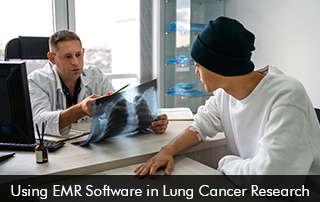November is lung cancer awareness month, and we take this as an opportunity to shed light to raise awareness about the disease and the different steps that can be taken to prevent it. Lung cancer is one of the prime causes of cancer deaths in the United States. The American Lung Cancer Association aims to help those suffering from lung cancer by offering support and holding a strong vision for a world liberated from lung diseases.
The Impact of Effective Lung Cancer Research
The field of lung cancer research has significant implications for patient outcomes, diagnosis, therapy, and prevention. Many healthcare providers make use of EMR Software systems in lung research to facilitate data collection and analysis.
The following are some noteworthy effects of lung cancer research:
- Early detection and prevention of disease
- Development of different treatment modules
- Targeted therapies of patients
- Personalized medicine
- Improved comprehension of tumor biology
- Drive clinical trials
- Boost health outcome levels
Beyond only improving patient care, lung cancer research has a substantial impact on public health campaigns, healthcare systems, survivor rates, and patient care. To further improve outcomes and lessen the impact of lung cancer on people and society at large, ongoing research efforts are essential and Electronic Health Records (EHR) Software plays a pivotal role.
The Role of EHR Software in Lung Cancer Research
Lung cancer research benefits greatly from the use of EMR Software, which makes data administration, collection, and analysis easier. EHR software systems can be applied in lung cancer research in the following ways:
Data Collection and Storage
Electronic patient data storage is made possible by electronic medical records software for healthcare professionals. With the proper authorization, researchers can use this data to collect data on patient demographics, medical histories, diagnostic procedures, treatment regimens, and outcomes of lung cancer. When it comes to conducting retrospective research or finding cohorts for future studies, this data can be extremely helpful.
Clinical Trials
Based on predetermined criteria, researchers can utilize EHR Software technology to find possible clinical trial applicants. EMR systems can help with patient recruitment, which makes it simpler to identify eligible subjects for research on therapies or treatments for lung cancer.
Data Mining and Analysis
The analytics and data mining technologies in the Electronic Medical Records software enable researchers to examine big datasets and spot connections, patterns, and trends among patient populations with lung cancer. Understanding disease development, treatment effectiveness, and outcomes can be aided by this analysis present in the software system.
Improved Patient Care
The ultimate goal of any research is to have a valuable impact on patient lives. Researchers can analyze EMR software data and identify potential areas of improvement related to lung cancer diagnosis and treatment, enhancing health outcomes.
AI Applications in EHR Software to Aid Lung Cancer Research
Artificial Intelligence (AI) systems that are integrated with Electronic Health Records Software are essential for advancing lung cancer research because they use sophisticated algorithms to effectively analyze large volumes of patient data. By spotting minute patterns or abnormalities in imaging images, these AI techniques can help radiologists spot possible lung cancer symptoms and aid in early detection.
To forecast illness development, treatment responses, and outcomes, AI-driven prediction models in EMR systems evaluate patient records. This capability helps clinicians make more educated judgments regarding individualized treatment plans
AI applications in EHR software systems can revolutionize lung cancer research by empowering researchers and providers to derive actionable insights and offer personalized treatment plans for lung cancer patients.







